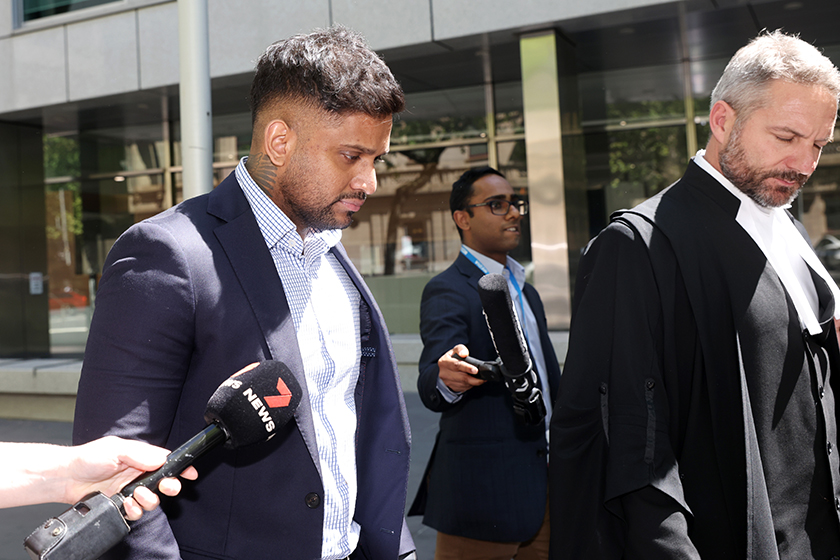This policy could make women's super more vulnerable to financial...
Australia’s opposition says early access to superannuation is an election policy for the party’s campaign. But...
READ MORE
In November 2022, the Endeavour Hills Cricket Club in Melbourne hosted the first in a series of two exhibition matches, featuring an impressive lineup of international cricket legends, including West Indies great Chris Gayle and Sri Lankan star Tillakaratne Dilshan.
In a stroke of poor luck for suburban cricket fans, excited at the unlikely prospect of seeing their favourite internationals on the local pitch, the series had been financed by a talent manager with a skill for invoice fraud – and he’d been caught out. The second match was cancelled when he faced 19 charges related to theft and deception.
But he nearly got away with it – in fact he had gotten away with it for more than 12 months. Here’s what accountants can learn from the situation.

In October 2023, Navishta Desilva pleaded guilty to charges relating to the theft of nearly $250,000 from his employer.
In October 2023, Navishta Desilva pleaded guilty to stealing nearly $250,000 from his employer, OmniVision.
Between March 2021 and July 2022, Desilva arranged 18 purchase orders from OmniVision, a security company, for its regular supplier CCTV Master, ostensibly for surveillance cameras.
He then used a fake email address, which appeared to belong to CCTV Master, to invoice OmniVision – the invoices directed payment to Desilva’s bank account.
The fraud was discovered in July 2022, after Desilva had left the company and another employee audited the transactions.
Desilva planned to use most of the money to fund two exhibition cricket matches organised by his company, Global Talent Entertainment. These matches would be hosted by the Endeavour Hills Cricket Club in southeast Melbourne, and feature international stars including Chris Gayle, Tillakaratne Dilshan, Shoaib Malik and Dimuth Karunaratne.
Desilva was sentenced to 200 hours of community service over three years and is working two jobs to repay the debt.
There has been no suggestion that Endeavour Hills Cricket Club or any of the exhibition match’s cricketers were involved in the scam.
Having worked in auditing in Deloitte for three years, Desilva had greater auditing knowledge and skill than many SME employees – he knew his way around security processes and procedures. There are, however, several ways company processes could provide better protection against fraud.
For a start, payments should be safeguarded by a delegation of authority.
“Internal financial fraud tends to occur in businesses that don’t have a delegation of authority process,” says Andrew Phelan, Accounting and Advisory Partner at Liston Newton Advisory.
“When it comes to paying bills owed to suppliers, you should have at least a two-person sign-off.”
Phelan suggests that the business owner who oversaw Desilva’s work should have been signing off every payment to every supplier.
“Without this, it can open businesses up to all types of financial misconduct from internal staff.”
It is also unlikely that Desilva’s employer checked whether the supplier had fulfilled the purchase orders before allowing payment, says Kapil Kukreja, risk and assurance partner, HLB Mann Judd.
Kukreja adds that monitoring of the supplier’s bank account details was probably insufficient.
“Changes to the [supplier’s] bank account were not verified directly with the supplier before changes were made to the [supplier’s] master file – or there was no independent review of changes to master files,” says Kukreja.
Phelan adds, “In some cases, as part of the secondary sign-off process, it is advised that business owners call each supplier to confirm their banking information has not changed before payment is approved and sent.”
The extent of Desilva’s crime demonstrates how quickly and dramatically fraud can happen without the right checks and balances.
“There are a number of ways accountants can help businesses prevent invoice fraud,” says Kukreja.
“These include implementing robust internal controls within [the processes governing] vendor creation and supplier vetting.”
Before every payment run, an independent person should review changes to vendor master files, while the establishment of role-based user access is important to ensure adequate segregation of duties.
Further, accountants should ensure that invoices are not paid before goods or services are received from the supplier.
In addition, accountants can reduce the degree of human control involved in invoicing – and, therefore, the likelihood of human error – by using software.
“We recommend business owners implement accounts payable data collection software,” says Phelan.
“This software allows business owners to electronically capture and store receipts, invoices and other supporting documents, and have them automatically sync with their required accounting software.”
Phelan adds that it also cuts out the manual data entry process, restricting the ability for anyone to change suppliers’ bank details and adding a review point should suppliers’ bank details need to be changed.
Vigilance is key.
“Accountants should conduct periodic reviews of user access to the [business’s] financial system and generate a vendor master file change report prior to every payment run, listing changes, including bank accounts, ABNs, etc.,” says Kukreja.
“The [report] should be reviewed by an independent person other than the staff who processes changes in the system. [Accountants] should also check that these changes are backed by adequate supporting documents received directly from the vendor.”
Further, fraudsters change their techniques and technologies often, so it’s important that accountants keep on top of the latest developments.
Phelan suggests three ways of staying up to date with the most effective methods of fraud mitigation:
When suspicion arises, it’s important to act quickly.
“Accountants should report to senior management, and seek advice prior to processing vendor master file changes and payments,” says Kukreja.
Any suspicion should be enough to prompt action – there is no need to wait for evidence before reporting suspicion. Should it transpire that suspicion is well-founded, the next step might be disciplinary action.